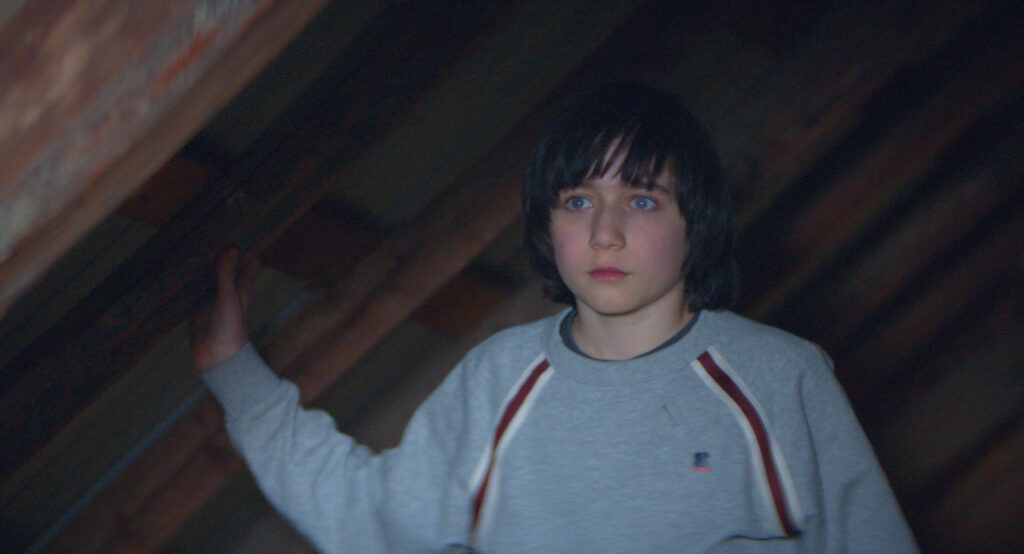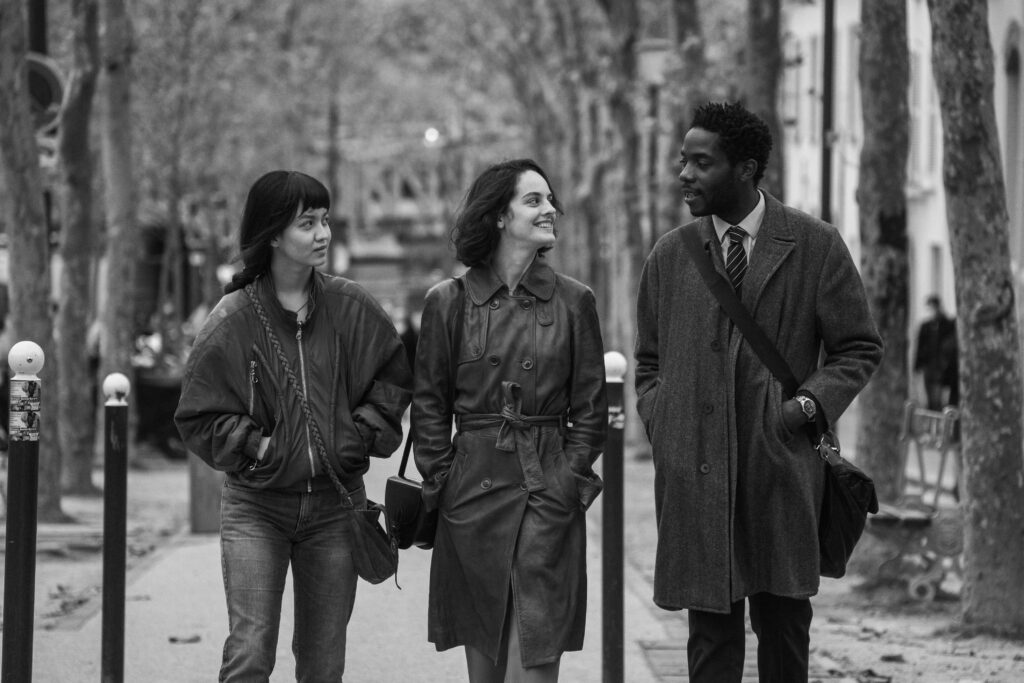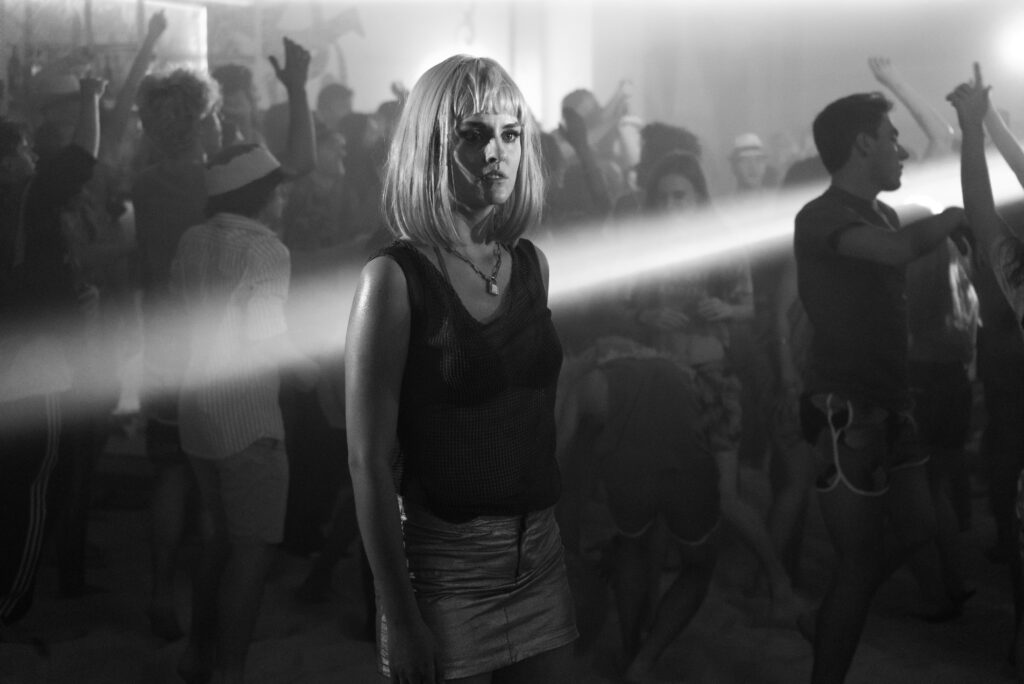October 2, 2023
by Carla Hay

Directed by Justine Triet
French with subtitles
Culture Representation: Taking place in France, the dramatic film “Anatomy of a Fall” features an all-white cast of characters representing the working-class, middle-class and wealthy.
Culture Clash: A famous novelist, who is a German immigrant, is accused of murdering her husband, who fell out of a third-floor window in their home.
Culture Audience: “Anatomy of a Fall” will appeal primarily to people who are interested in watching well-acted psychological thrillers and courtroom dramas.

“Anatomy of a Fall” is an above-average mystery thriller that will leave people guessing about the answer to the mystery. The movie is a little too long, but the courtroom scenes are riveting. “Anatomy of a Fall” had its world premiere at the 2023 Cannes Film Festival, where the movie won the Palme d’Or, the festival’s top prize.
Directed by Justine Triet (who co-wrote the “Anatomy of a Fall” screenplay with Arthur Harari), “Anatomy of a Fall” is a sprawling movie with a total running time of 152 minutes. The film achieves a tricky balance of spending a lot of time exploring the psyche of the story’s protagonist while still giving viewers the feeling that the protagonist is still too mysterious to completely know. This inscrutability is why the ending of the movie is effective but will be unsettling to viewers who want clear and undeniable answers at the end the story.
“Anatomy of a Fall” begins by showing a fateful day in the life of an affluent family living in a fairly remote French Alps chalet near Grenoble, France. The family has been living in this chalet for about one year. Early on in the story, one of the family members will die on the house’s property.
Sandra Voyter (played by Sandra Hüller) is a German immigrant who is a well-known, successful novelist. Her husband Samuel Maleski (played by Samuel Theis) is a university professor who is an aspiring writer. Their 11-year-old son Daniel (played by Milo Machado Graner) is visually impaired because his optic nerves became permanently damaged after he was accidentally hit by a motorcycle when he was younger. Daniel isn’t completely blind but his vision very limited.
The day starts off in a fairly normal manner. It’s winter, so there is snow all around, but the day is sunny and clear. Sandra is being interviewed in the family home by a graduate student journalist named Zoé Solidor (played by Camille Rutherford), who is a star-struck fan of Sandra.
During the interview, Sandra gets annoyed because Samuel is in the third-floor attic and is playing music that is loud enough to be heard in the room where the interview is taking place. An irritated Sandra loudly tells Samuel to turn down the music more than once before he finally does so. The song that he’s playing is Bacao Rhythm & Steel Band’s cover version of 50 Cent’s 2003 song “P.I.M.P.,” which is played several times later in the courtroom scenes.
After Zoé leaves, Daniel comes back from a walk with his guide dog, a Border Collie named Snoop. (The dog’s name is real life is Messi.) To his horror, Daniel finds the dead body of Samuel on the ground outside the home. It appears that Samuel has fallen out of the attic window of the house. Was it an accident, suicide or murder?
Those are the questions that continue to swirl when Sandra becomes a person of interest when the investigation into the death begins. Sandra claims she was taking a nap at the time that Samuel fell out of the window. About an hour into the nap, she heard Daniel scream when he found Samuel’s body.
She also tells investigators and her defense attorney Vincent Renzi (played by Swann Arlaud) that she thinks Samuel’s death was an accident. Vincent tells Sandra, “Nobody is going to believe that. I don’t believe that.”
An autopsy reveals that Samuel had a severe blow to his head before he died, but the cause of death is ruled as inconclusive. Sandra then changes her theory of how Samuel died by saying that he could have committed suicide. She tells authorities and Vincent that she remembers that about six months earlier, she found Samuel unconscious in a puddle of his vomit because he had taken an intentional overdose of sleeping pills.
Sandra, who admits she was the only other person in the house when Samuel died, becomes the only suspect. She’s arrested for murder, indicted, and then goes on trial, one year after Samuel’s death. Sandra pleads not guilty. Her defense is that the blow to Samuel’s head probably came from a small wooden shed located directly beneath the window, with the theory being that Samuel hit his head on the shed during the fall, before he fell on the ground. However, there was no DNA found on the roof of the shed.
Vincent tells Sandra early on when they begin working together that he doesn’t know if she’s guilty or not guilty, but he expects her to be honest with him. As time goes on, people find out that Sandra has many secrets. She’s often dishonest and rude, which affects her credibility and likability. But is she guilty of murdering Samuel?
One of the truths that come out during the trial is that Samuel and Sandra had a troubled marriage before he died. Sandra and Samuel met when they were both living in London, and he had just become a university professor. Their relationship revolved around “intellectual stimulation, even at the expense of everything else,” says Sandra.
Samuel and Sandra had a volatile marriage that got worse after Samuel convinced Sandra to move from London back to his native France. Sandra tells Vincent in a private conversation that she was very happy in London. She bitterly says of the decision to move to France: “I left my shithole in Germany to live in his shithole.” Sandra tells Vincent that Samuel was a frustrated and wannabe novelist who couldn’t finish a manuscript and was jealous of her success as a published author.
Sandra, who is openly bisexual, is described in the movie as being very seductive and alluring when she wants to be. She admits that she had sexual relationships outside the marriage, including an affair with a woman. Samuel knew about these affairs. According to Sandra, he wasn’t happy about the infidelity, but he tolerated it.
More suspicion falls on Sandra when it’s revealed that Samuel secretly made an audio recording of a violent argument that he and Sandra had the day before he died. The recording is played in court, but it’s difficult to tell from the recording who initiated the violence. At the time of Samuel’s death, Sandra had a bruise on her elbow. She says she got the bruise from accidentally bumping into a kitchen counter at her home.
One of the more memorable aspects of “Anatomy of a Fall” is how this entire ordeal affects Daniel. After the death of Samuel, introverted Daniel becomes very depressed to the point where it’s difficult for him to get out of bed. He’s assigned a child therapist named Marge Berger (played by Jehnny Beth), who is compassionate and tries to remain as neutral as possible with Daniel about what she thinks about Sandra.
As time goes on in the trial, the prosecutor (played by Antoine Reinartz) and the media seem determined to place the marriage of Sandra and Samuel on trial too. Sandra is also judged for not being a stereotypical image of a warm-hearted, nurturing and virtuous mother. It’s the movie’s way of observing how society can judge mothers who are on trial for murder.
Sandra is not cruel, but she is certainly a complicated person. The movie leaves it up to viewers to decide how manipulative she might or might not be. Hüller gives a masterful performance as someone who thinks she’s smarter than the average person and has little to no patience with anyone who doesn’t agree with her point of view. Graner gives a standout performance as vulnerable Daniel, who might have some secrets of his own.
“Anatomy of a Fall” has well-written courtroom scenes that will keep viewers interested in what will happen next. There’s also a point in the movie where it looks like Sandra and Vincent look like they’re attracted to each other. Will they act on this attraction? And is Sandra faking this attraction to manipulate Vincent? It’s a testament to the excellent writing and performances in “Anatomy of a Fall” that the movie raises many questions but the answers are not always predictable or simple.
Neon will release “Anatomy of a Fall” in select U.S. cinemas on October 13, 2023. The movie will be released on digital an VOD on December 22, 2023.


